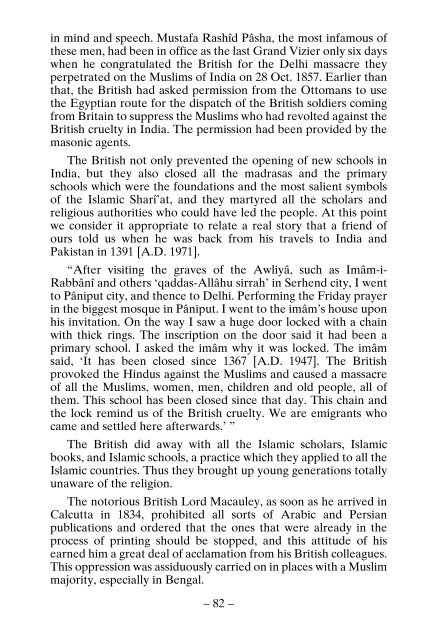Confessions Of A British Spy
Muhammad of Najd was the sort I had been looking for. For his scorn for the time’s scholars, his slighting even the (earliest) four Khalîfas, his having an independent view in understanding the Qur’ân and the Sunna were his most vulnerable points to hunt and obtain him. So different this conceited youngster was from that Ahmed Efendi who had taught me in Istanbul! That scholar, like his predecessors, was reminiscent of a mountain. No power would be able to move him. Whenever he mentioned the name of Abû Hanîfa, he would stand up, go and make an ablution. Whenever he meant to hold the book of Hadîth named he would, again, make an ablution. The Sunnîs trust this book very much. Muhammed of Najd, on the other hand, disdained Abû Hanîfa very much. He would say, “I know better than Abû Hanîfa did. In addition, according to him, half of the book of wrong.
Muhammad of Najd was the sort I had been looking for. For
his scorn for the time’s scholars, his slighting even the (earliest)
four Khalîfas, his having an independent view in understanding
the Qur’ân and the Sunna were his most vulnerable points to hunt
and obtain him. So different this conceited youngster was from
that Ahmed Efendi who had taught me in Istanbul! That scholar,
like his predecessors, was reminiscent of a mountain. No power
would be able to move him. Whenever he mentioned the name of
Abû Hanîfa, he would stand up, go and make an ablution.
Whenever he meant to hold the book of Hadîth named he would, again, make an ablution. The Sunnîs trust this book
very much.
Muhammed of Najd, on the other hand, disdained Abû Hanîfa
very much. He would say, “I know better than Abû Hanîfa did.
In addition, according to him, half of the book of wrong.
You also want an ePaper? Increase the reach of your titles
YUMPU automatically turns print PDFs into web optimized ePapers that Google loves.
in mind and speech. Mustafa Rashîd Pâsha, the most infamous of<br />
these men, had been in office as the last Grand Vizier only six days<br />
when he congratulated the <strong>British</strong> for the Delhi massacre they<br />
perpetrated on the Muslims of India on 28 Oct. 1857. Earlier than<br />
that, the <strong>British</strong> had asked permission from the Ottomans to use<br />
the Egyptian route for the dispatch of the <strong>British</strong> soldiers coming<br />
from Britain to suppress the Muslims who had revolted against the<br />
<strong>British</strong> cruelty in India. The permission had been provided by the<br />
masonic agents.<br />
The <strong>British</strong> not only prevented the opening of new schools in<br />
India, but they also closed all the madrasas and the primary<br />
schools which were the foundations and the most salient symbols<br />
of the Islamic Sharî’at, and they martyred all the scholars and<br />
religious authorities who could have led the people. At this point<br />
we consider it appropriate to relate a real story that a friend of<br />
ours told us when he was back from his travels to India and<br />
Pakistan in 1391 [A.D. 1971].<br />
“After visiting the graves of the Awliyâ, such as Imâm-i-<br />
Rabbânî and others ‘qaddas-Allâhu sirrah’ in Serhend city, I went<br />
to Pâniput city, and thence to Delhi. Performing the Friday prayer<br />
in the biggest mosque in Pâniput. I went to the imâm’s house upon<br />
his invitation. On the way I saw a huge door locked with a chain<br />
with thick rings. The inscription on the door said it had been a<br />
primary school. I asked the imâm why it was locked. The imâm<br />
said, ‘It has been closed since 1367 [A.D. 1947]. The <strong>British</strong><br />
provoked the Hindus against the Muslims and caused a massacre<br />
of all the Muslims, women, men, children and old people, all of<br />
them. This school has been closed since that day. This chain and<br />
the lock remind us of the <strong>British</strong> cruelty. We are emigrants who<br />
came and settled here afterwards.’ ”<br />
The <strong>British</strong> did away with all the Islamic scholars, Islamic<br />
books, and Islamic schools, a practice which they applied to all the<br />
Islamic countries. Thus they brought up young generations totally<br />
unaware of the religion.<br />
The notorious <strong>British</strong> Lord Macauley, as soon as he arrived in<br />
Calcutta in 1834, prohibited all sorts of Arabic and Persian<br />
publications and ordered that the ones that were already in the<br />
process of printing should be stopped, and this attitude of his<br />
earned him a great deal of acclamation from his <strong>British</strong> colleagues.<br />
This oppression was assiduously carried on in places with a Muslim<br />
majority, especially in Bengal.<br />
– 82 –


